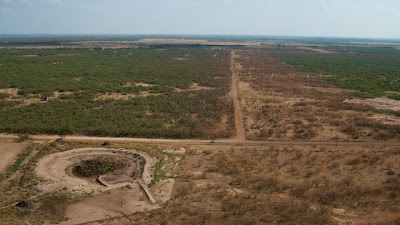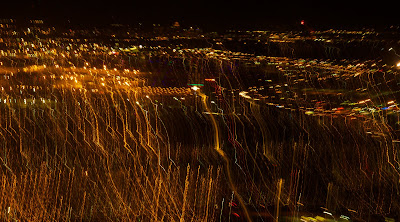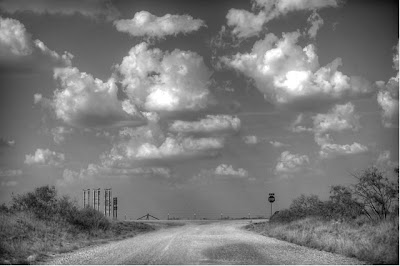The barrow pit so often mentioned in Penny's blog this summer provides very little water for shorebirds during this drought.
Ponds everywhere have dried up.
Farmer's driving across dry wheat fields leave a sort of art on the field.
Farmer's swirls.
The wider angle of the countryside shows the mesquite plants, in green, doing just fine in the drought, as expected, a dry pond to the left, and a swath to the right, from bottom to top, following the dirt road, of dead foliage. The crop-duster sprayed a new kind of herbicide that kills the mesquite plant. Along this section, he experimented with the efficacy of the new herbicide. Mesquite plants provide shelter for wild life, in addition to cattle, which is what annoys the cowboys and why they strive to eradicate the plant. The cowboys cannot see the cattle in the mesquite to find them, and then when they ride through the mesquite looking for the cows, thorns tear into their skin and their horses.
Is that a crater caused by a meteorite? No, it is a pond that, having dried up, was cleaned by the bulldozer guy. When and if it ever fills up again, it will hold more and cleaner water for the cattle.
What are these ladies eating?
The shadow of the helicopter flying over dried grasslands and thriving Prickly Pear cacti.
The shadow of the helicopter quickly approaches and oil pump.
Sometime ago an attempt to drill for oil yielded nothing except this peculiar land mass, now eroding into the surrounding hill.
A closed gate that leads to the oil pump holds a sign that says, "No Smoking," and a sign to its right says, "320 acres more or less." That's Prickly Pear cacti to the right of the sign.
Some of the water looks green. Eek. Here we see a wild hog enjoying the mud, in spite of the green, and creating circles in the still water. This image, enlarged, looks highly intriguing, for the circles and for the loneliness of the hog, an over-populated species now pursued ruthlessly by landowners.
The white birds in the water are Pelicans. They have elected to remain at Lake Wichita all year.




























































